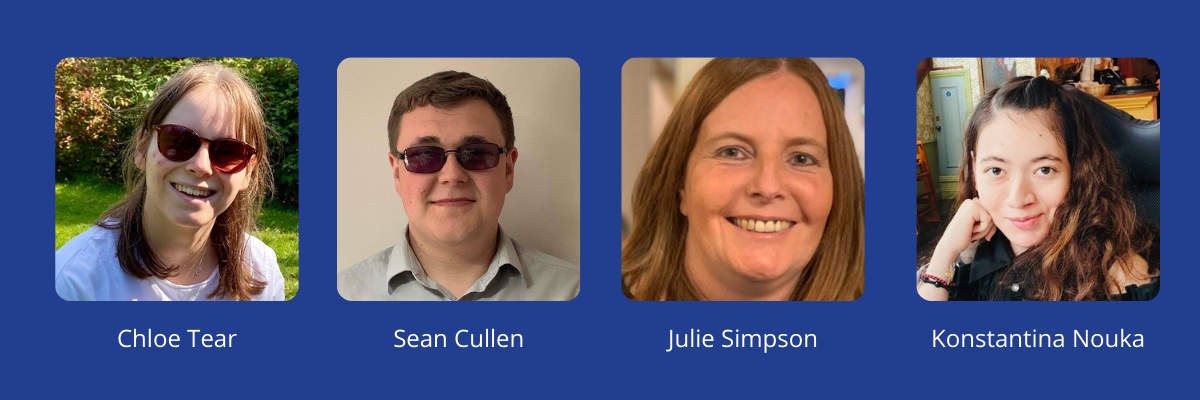To coincide with this year’s Mental Health Awareness Week (May 10-16), we asked four individuals to consider the importance of mental health and share their techniques for establishing a happier headspace.
Chloe Tear is a disability blogger and content designer for Scope. She is blind and has Cerebral Palsy.
Sean Cullen is a Doctoral Researcher at Brunel University, student commissioner for the DSC and lower limb amputee who has Dyslexia and photosensitivity (Irlen Syndrome).
Julie Simpson is a full-time carer whose son Joe has severe autism and learning difficulties, and the founder of Autism Adventures.
Konstantina Nouka is a law student and Disabled Students’ Officer at Reading University who was born with Ullrich Muscular Dystrophy.
How important do you feel it is that we openly discuss our mental health?
CT: It’s absolutely crucial, especially considering the pandemic we are going through. Anyone can struggle with their mental health yet there is still a stigma that we need to remove.
We need to continue to talk about our mental health issues; it’s the only way we can normalise our experiences. I know, from my own experiences, how hard it can be to open up. You feel like you’re the only person in the world, but that isn’t the case. Support is out there.
KN: In Greece, my home country, we say that if the mind is not well then the body cannot be well either. Mental health is as important as our physical health and it really frustrates me when people do not admit that they are mentally suffering. We must discuss mental health in our everyday life, with our family and friends or even colleagues, because there is nothing to be ashamed or embarrassed about.
Does it feel like society has improved, in terms of being more willing to discuss mental health?
CT: I think yes, as a society we are getting better at talking about mental health, yet there does seem to be a line. For example, speaking about suicidal thoughts is still frowned upon. It’s important to acknowledge how debilitating it can be. Yes it’s amazing that mental health is spoken about more within the media and within schools, but we need to improve the support that people receive. Unfortunately, you often have to be in crisis before the support is offered. I’d like to see things being done before people get to that level.
JS: More could be done to improve awareness by investing in programmes for hard to reach areas of society that may still feel mental health is a weakness. In my experience, a lot of older males in working class areas were brought up to “man up” and still see it as a weakness to express emotions. That has to change.
Investment in grassroots services, reducing waiting times and reducing the criteria to access services could also all be improved. We’ve come a long way in recent years but there’s still a long way to go.
SC: We need better proactive and reactive support, such as workplace understanding for mental health to help reduce stress build-up, with a proactive home support system. This combined with better funding for counselling will help massively, taking us away from a competition based access to support.
For more tips on things to do to keep yourself busy and reduce stress in these times, check out our list of five proven methods to help keep your worries at bay.
If you could improve any aspect of how we approach mental health, what would you focus on first?
KN: I just want it to be easier to know what support is out there for anyone who needs help – and to then have easier access to it. This year has been extremely challenging and so many people need mental health support but they don’t really know where to turn. Things like University Mental Health Day and Mental Health Awareness Week are definitely steps in the right direction.
JS: I think we need more funding of grassroots services to enable more people in crisis to get support before they reach crisis point. Too often the help is coming too late, which is something that has to be addressed.
The theme for Mental Health Awareness Week this year is ‘Nature’. How important is nature and being outdoors for you in managing your mental health?
SC: It’s incredibly important to me, as it is to so many people. I find walking and spending time outdoors is my favourite thing to do – dog-walking, camping, hiking, motorcycling, fishing. Even though these activities are made challenging by my disability, they are still the most important things for stress relief for me. The lack of noise and the ability to switch off from work is vital, creating a physical barrier to the electronics in my life.
During the lockdown period, when I wasn’t able to leave the house as much, I found that growing house plants brought me back to nature and had a beneficial effect.
KN: I feel extremely lucky that I live in the countryside and am able to take long walks in green fields. That’s been particularly helpful throughout the COVID-19 pandemic. By taking those walks I feel that I can de-stress as my attention is turned to things like trees and flowers and everything looks much more optimistic and cheerful. Nature has been key in establishing good mental health for me.
JS: Being outdoors and surrounded by nature is absolutely vital for everyone’s mental health. We will be starting a new project with Autism Adventures after lockdown called Blue Autism which will incorporate water therapy to support our young people’s mental health. We also have the walk a mile project for autism awareness month to support mental health and we fully appreciate how important the outdoors and nature is for mental health.
And finally, can you share any coping techniques that benefit your mental health and headspace?
KN: What works well for me is if I make lists of what I can control and what I cannot. I am obsessive about lists! Writing things down allows me to focus on only the things I can control and not waste time and energy on things I can’t. That lets me do my absolute best to get the outcome that I desire.
SC: I’ve found breaking my time down to shorter periods of work with set smaller goals helps my mental health. Instead of setting one large task for the day, I set four or five smaller ones. Having one large task can feel overwhelming, so smaller is better, with regular breaks.
I’ve also found that having a regular and established sleep and wake up time is very helpful. I just find I’m better able to focus and achieve my goals if I have a routine.
CT: Writing is my outlet. As a blogger [at www.chloetear.co.uk], my writing helps me to process what is going on around me. I also find journaling therapeutic and use it to free write. This means I literally just write what comes into my head. It doesn’t need to make sense or be about a specific topic, but it’s a great tool to clear your mind.
JS: The most effective way to cope mentally for me is to focus on managing my own life and family and not compare anything to others. I try to exercise at least twice a week and I make a daily ‘to do’ list. Even if it’s just ‘do the shopping’, having that list and ticking things off shows me I’ve achieved something that day. Lockdown has been very hard for everyone and I’ve made sure to write down things I want to do when it’s all over so that I have something positive to focus on. That list reminds me that it will eventually be over.
Mental Health Awareness Week takes place from May 10-16, 2021. For more details, visit www.mentalhealth.org.uk
The Motability Scheme enables disabled people and their families to access a brand new car or scooter by exchanging their mobility allowance to lease the vehicle of their choice. Find out more:
Related articles
A fun day out in nature does more than you think
4 ways to get your worries under control
![]()









